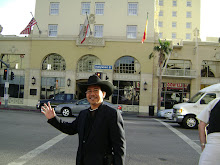Here are the ABSTRACTS for our Plenaries and Workshops in the upcoming IPCAP 3rd National Convention at the Square Hall, University of Baguio, Gen. Luna Rd., Baguio City this coming Feb. 3-5, 2010:
A. PLENARY ABSTRACTS
Plenary # 1: “Ethics & Values in Our practice”
Speakers: FR. BERNARDO R. COLLERA, SVD RGC & MS. AVELINA L. MANDIN, RGC
Abstract: The person of the counselor is an important determinant in one’s personal and eventually counseling relationship. If Ethics and Values are well considered and activated, the energies behind our actions and sources of meaning in life all help professional Counselors to become more and more conscious of what ethical frameworks we go by in our practice, the values we have, especially as to how these affect or influence our counseling relationships and practice.
Participants identify some of their personal values and reflect on the alignment of these values to those which are considered desirable for professional and effective / ethical counseling practice. They shall likewise be reoriented to the various ethical frameworks that are operant in ethically-sound professional practice of Guidance and Counseling. This process can likewise help counselors in charting an ongoing growth project as a person and as a professional.
Plenary # 2: “Quality Indicators and Upgraded Competencies”
Speakers: MS. MA. LEONILA V. URREA, RGC & DR. ELVIRA IRENE G. RAMOS, RGC
Abstract: When is similar different? Professional school counselors everywhere would customarily utilize the same components in designing their guidance programs and services every year in response to the needs of the students. Their competencies are thereby demonstrated in the implementation of these programs and services. However, the similarities in the school counselors’ program designs and services would only imply a difference when they can competently show that they are able to make a difference in the lives of the students in more quantifiable measures. Employing the American School Counselor Association (ASCA) National Model as a benchmark in creating our indigenous national model, the talk would focus on helping students develop competencies deemed important in enhancing their emotional, physical, social and career choices and success, as well produce the call to constantly upgrade counselor competencies in addressing these goals in their clientele. Likewise, it will identify indicators of quality essential in monitoring their performance and progress towards the set goals and objectives. Thus, quality is discussed in the light of an acceptable standard as a minimum indicator, and its application is then demonstrated in the design and delivery of the guidance programs and services, so that the target improvements in the students’ lives can be measured and appreciated.
Plenary # 3: “Encountering the Transcendence in our practice ”
Speakers: MS. MARIA TERESA T. CARDENAS, RGC & MR. CESAR S. CONG, RGC
Abstract: If one’s minor and major paths in life are clear and on purpose, journeying through life becomes more whole and meaningful. A key to arriving at an average state of wholeness is by self-transcending. In these plenary talks, transcendence will be looked at as an aspect of transpersonal psychology, as examined by Abraham Maslow. Victor Frankl and M Scott Peck will also be referred to as two of some philosophers / psychologists who, in the speaker’s point of view, have contributed to the value of making transpersonal psychology part of a “counselor’s possible arena of concern.” Also, the various meanings of transcendence will be explored but will focus on its being, in particular, a leap of faith, encountering the Transcendent particularly in the Christian tradition, and going beyond oneself without losing one’s Self. So that there will be a practical relevance to counseling, transcendence experiences of people will be narrated. It is also hoped that through this talk, there will be a deeper awareness of the importance of a counselor’s own self-transcendence in order to help his/her own counselees transcend.
Plenary # 4: “Breaking the Mold of Counselor Perception”
Speaker: DR. LILIAN G. GANDEZA, RGC
Abstract: The Guidance and Counseling Act of 2004 or RA 9258 is the force that breaks the old, traditional, well-intentioned but nonprofessional counseling practices in our country wherein oftentimes, counselors lacked the knowledge, the training and skills, and the character that befit the professional help-giver. This law is the catalyst in the birth of the counselors with professional integrity owing to their value choices, faithful adherence to ethical standards and continuous upgrading of competencies in the practice.
The implementation of RA 9258 creates the new mold of Filipino counselors as persons and professionals who are characterized with openness and receptivity to the experience with the counselee and the Transcendent. Creating a new mold of professional integrity includes facing the challenges and demands of (1) establishing comfort zones of competence and long-term effectiveness, (2) awareness and avoidance of forbidden zones in practice, and (3) treating the guidance and counseling arena as a hallowed ground of growth facilitating counselor-counselee interaction.
Plenary # 5: “Formulating Professional Integrity”
Facilitator: DR. RENELYN SALCEDO, RGC
Abstract: After having heard all four plenary presentations, all participants shall be grouped in order to develop one’s personal profile of integrity as well as recommend qualities of integrity in practicing Guidance Counselors.
B. WORKSHOP ABSTRACTS / DESCRIPTIONS
Workshop 1: Dealing with infidelity in marital counseling
Facilitator: Dr. Julian R. Montano, RGC
Moderator: Ms. Agusdan, RGC
Abstract: Marital or couple’s relationships are under siege! There are greater varieties of triggers for break-ups. In this workshop, general and unique considerations regarding couples’ therapy will be discussed. Plus participants will look at the most common couples’ issues with emphasis on infidelity. Ultimately, a specific counseling approach in dealing with couples suffering/recovering from infidelity issues will be presented and practiced.
Workshop 2: Handling cyber bullying in school
Facilitator: Ms. Rachel C. Ong, RGC
Moderators. Terry Ong, RGC & Tintin Acosta, RGC)
Abstract: In the 21st century, bullying has progressed since technology has played a big impact on our lives, particularly the use of computers and cellphones. Although these two information technologies serve various purposes these could also bring danger to the children, teenagers and even adults. With the advent use of technology, bullying had taken a new form which is called cyber bullying. In this form of bullying, bullies use internet, social networks, cellphones and other electronic gadgets to harm or hurt the bullied which has detrimental effects to the victim. School counselors as well as teachers and school authorities might have
difficulty on tracking the bullies and the bullied since they use electronic gadgets in doing the act. Hence, cyber bullying has become one of the challenges of today’s school counselors, teachers, and school authorities. Participants in this 4-hour seminar-workshop will have a bird’s eye view on the concept of bullying, a deeper understanding on the context of cyber bullying, and the description of the triad: the bully, the bullied and the bystander. Furthermore, this seminar-workshop will also give additional awareness and knowledge on the role of the counselors as well as the teachers and the school authorities in addressing the cyber bullying issues in school. Lastly, the seminar-workshop will give a chance to the participants to apply the acquired techniques on handling cyber bullying in school through an activity.
Workshop 3: Developing a treatment plan in counseling
Facilitator: Dr. Alda Perlita S. Polestico
Moderator: Ms. Aurora Parcasio, RGC
Abstract: The design of counseling services is to help individuals overcome psychological and emotional problems within their daily lives. The overall process provides the direction needed in order for change to take place in a person’s life. Counseling treatment plans map out these changes, and provide guidelines how change can occur. Counseling treatment plans are blueprints for constructing the changes the client wishes to make. Most treatment plans that respect the client’s rights to self-determination and informed consent are the result of collaborative effort between the client and the counselor. Quality care in requires counselors to move rapidly from problem assessment to the formulation and implementation of the treatment plan. This workshop shall present the process of developing counseling treatment plans that present the client’s workable problems, long-term goals and short-term objectives, diagnosis, as well as necessary therapeutic interventions.
Workshop 4: Doing multicultural counseling in the Philippines
Facilitator: Dr. Barbara Wong-Fernandez, RGC
Abstract: This workshop intends to familiarize counselors with two new frameworks on multiculturalism: the dimensions of diversity and the path to cultural competency, to enable the development of multicultural attitudes among their clients, and to build up skills in multicultural counseling. There will be interactive, reflective, and sharing sessions among the participants.
Workshop 5: OLS for Guidance and Counseling
Facilitator: Dr. Jaime R. Bolusan, RGC
Abstract: Optimum Learning is a presentation of a concept which incorporates music, video clip presentation, games and stories for one’s intellectual and personal development. It is expected that after the presentation, the participants will be able to strengthen their memory and accelerate their mastery. It activates hidden brain/mind energy using appropriate sequenced music and other stimuli with special psychological techniques. It empowers memory and recall. It enables the participant high achievement and super productivity and generates creativity and motivation. Further, it eliminates counterproductive stress, to transform negativity into positive energy, to speed healing of negative self concept and painful memories.
Search This Blog
Monday, January 10, 2011
Subscribe to:
Post Comments (Atom)



1 comment:
Hope other orgs can post their abstracts before their events so RGCs can have a choice whether the event is worth it or not. In this way, we raise the standards of our choices, something which is more pro-Guidance profession than anything else.
Post a Comment